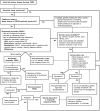The Evidence-Based Approach to Adult-Onset Idiopathic Nephrotic Syndrome
- PMID: 26442238
- PMCID: PMC4585181
- DOI: 10.3389/fped.2015.00078
The Evidence-Based Approach to Adult-Onset Idiopathic Nephrotic Syndrome
Abstract
Adult-onset nephrotic syndrome (NS) differs from its pediatric counterpart in several important ways. Most importantly, NS in adults is more etiologically heterogeneous compared to children, and thus treatment approaches rely heavily on the histological diagnosis provided by renal biopsy. The evidence-based approach to treatment of adult NS has been critically examined by the Kidney Disease Improving Global Outcomes (KDIGO) guidelines in glomerulonephritis, published in 2012. Here, we examine the strengths and limits of those guidelines and review recent work that expands the evidence-based approach.
Keywords: KDIGO guidelines; clinical practice guidelines; focal segmental glomerulosclerosis; minimal-change disease; nephrotic syndrome.
Figures

References
-
- Kidney Disease Improving Global Outcomes Glomerulonephritis Work Group. KDIGO clinical practice guideline for glomerulonephritis. Kidney Int Suppl (2012) 2(2):139–274.10.1038/kisup.2012 - DOI
Publication types
LinkOut - more resources
Full Text Sources
Other Literature Sources
Miscellaneous

